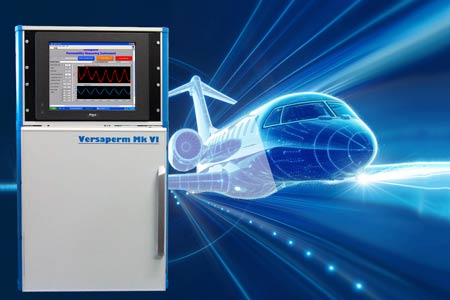Hydrogen Vapour Permeability Problems
Aerospace and Automotive

Click
on the image to download a print quality scan
Hydrogen is increasingly seen as a cornerstone of future transport technology, but its extremely small molecular size makes it a formidable challenge for engineers in both the aerospace and automotive industries. Versaperm has developed a range of advanced permeability measurement equipment that allows manufacturers and researchers to test and quantify hydrogen vapour permeability with exceptional accuracy. This capability is vital for ensuring that materials used in tanks, seals, membranes and pipelines are able to withstand hydrogen’s tendency to escape, while also performing reliably across the wide range of operating conditions demanded by vehicles and aircraft.
Hydrogen vapour permeability is a critical issue across both automotive and aerospace applications and affects the safety, efficiency and durability of both fuel cells and storage systems. Materials must simultaneously deliver safety, efficiency and long service life, often under harsh operating conditions. Proton exchange membranes and gas diffusion layers depend on tightly controlled vapour transport to maintain ionic conductivity without flooding, while elastomeric seals and gaskets must resist hydrogen leakage through repeated cycles of pressure, humidity and temperature variation.
Storage systems present even greater challenges, with road vehicles requiring liners that can retain compressed hydrogen at up to 700 bar for over a decade of use, while aerospace structures must manage cryogenic liquid hydrogen with minimal boil-off losses and without structural degradation at altitude. Even sub-permeation levels can create unacceptable efficiency losses or safety risks if left uncharacterised.
Versaperm’s instrumentation provides the precise, repeatable measurements required to address these challenges. By simulating operating conditions such as elevated or cryogenic temperatures, variable humidity and both static and cycling pressures, the systems generate detailed datasets that support both material development and component qualification. These measurements enable engineers to optimise lightweight composite designs, validate barrier coatings and assess long-term stability in line with regulatory standards including SAE, ISO and ASTM protocols.
As hydrogen takes its place at the heart of zero-emission transport strategies the ability to measure and control vapour permeability is becoming not only a scientific necessity but a commercial one. Versaperm’s vapour permeability testing systems offer the automotive and aerospace industries the confidence to overcome these challenges and to accelerate the development of hydrogen technologies that are safe, efficient and ready for the future of transport.
ENDS
Please send
any sales enquiries to Christopher Roberts, Versaperm Limited,,
10 Rawcliffe House, Howarth Road, Maidenhead, Berkshire, SL6 1AP, UK, Tel: +44 (0) 1628 777668,
e.mail info@versaperm.co.uk
Web http://www.versaperm.co.uk
For further
Press Information please contact Gerry Palmer @
T the Palmer & Rose
Partnership.
Tel +44 (0) 1494 637499, e.mail gerry@palmer-rose.co.uk.
|

